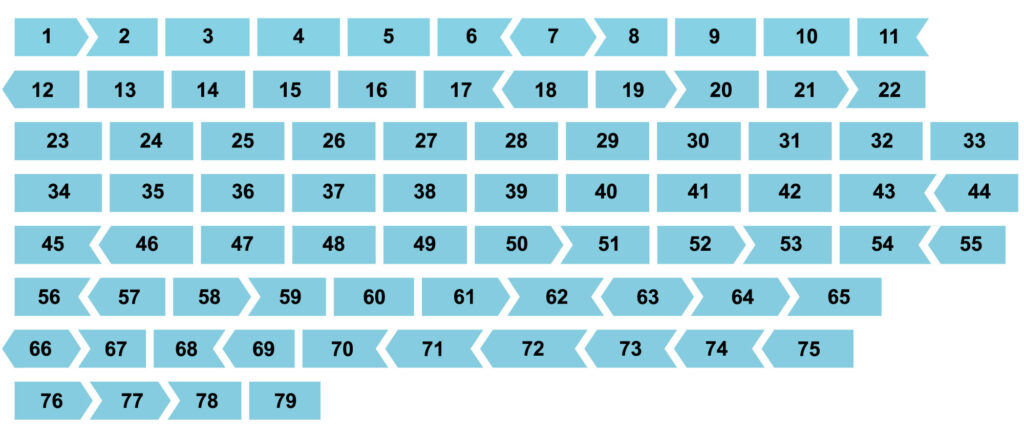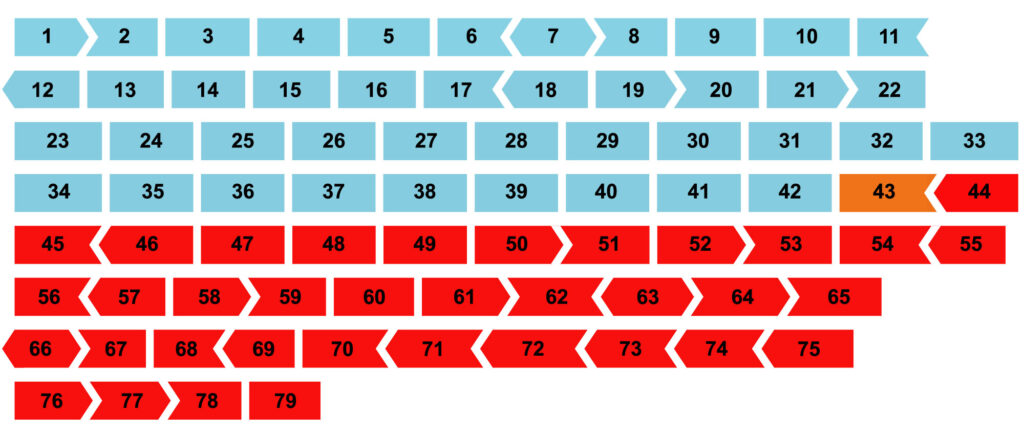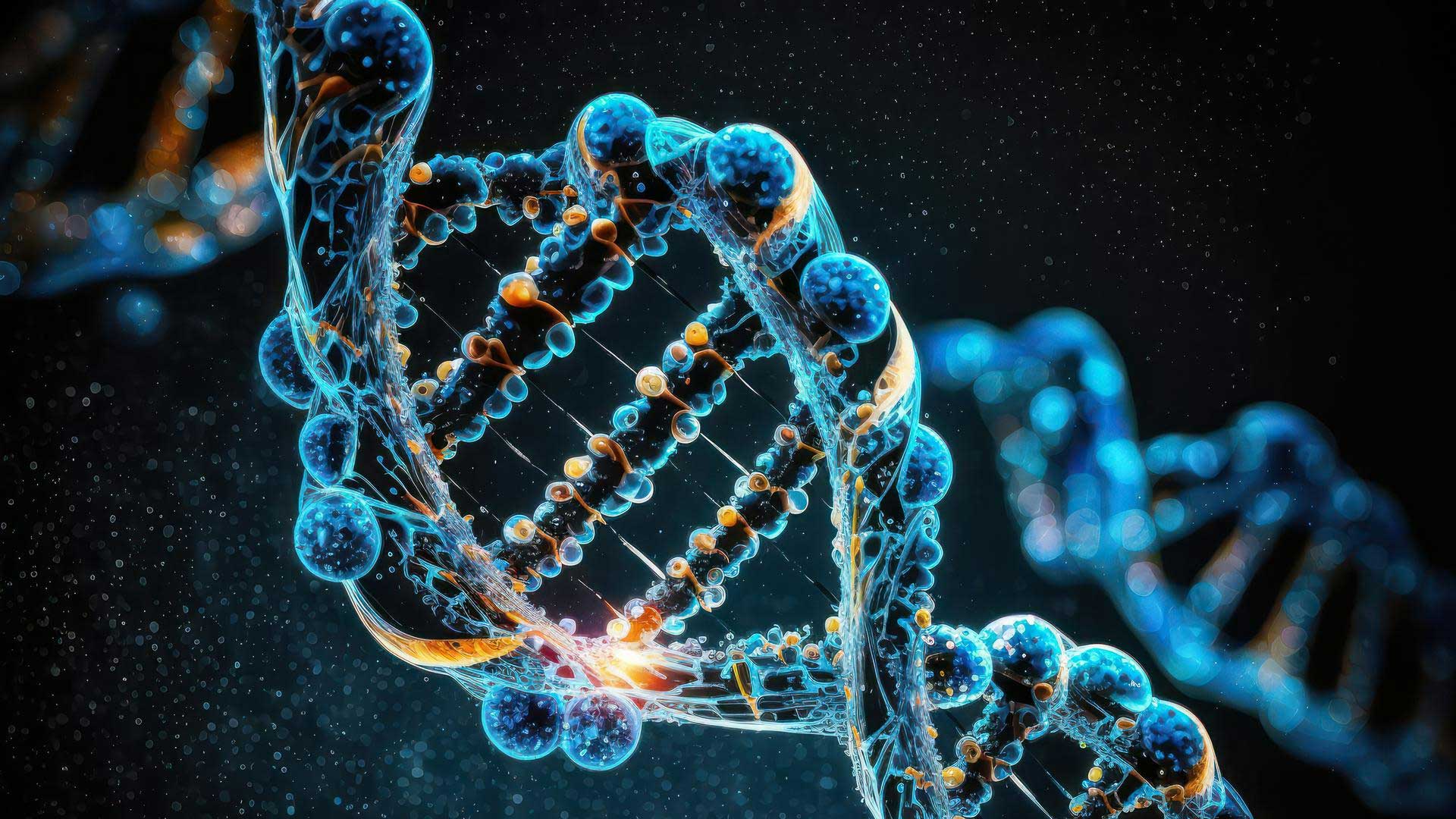As you know, the dystrophin gene, known as the gene with the longest DNA sequence in our body, has 79 exons. These exons follow each other from beginning to end like train vagons, reaching the 79th vagon at the end. In this way, our body’s muscle production or protection is provided.

When one or more of these exons are missing, it is not possible to reach the 79th exon because there will be a break in between. Of course, not every exon deficiency causes this situation. There is also a different type of DMD called BDM, which is less severe and provides a longer life expectancy. When you understand the sequence of the Dystrophin gene, you will learn how this is possible.
Table of Contents
What happens in Becker muscular dystrophy?
To explain this situation, let’s take a closer look at the section between exon 39 and 44.

In Becker muscular dystrophy, an exon is deleted, let’s say exon 42 is deleted as in our example. [Read More: What is Exon Deletion in DMD?]

Even if a part of the gene is missing, exon 41 can join with exon 43 and the train cars can be completed to the end of the gene. The point to be noted here is the junction points between the two exons. You can think of it like a puzzle.

Exon deletion causes DMD. But it is important which exon is deleted. As you can see in the example above, exon 42 was deleted, but 41 and 43 were still connected so the train cars could continue to move. In this case, the patient is usually diagnosed with BDM. In BDM, the disease shows relatively mild symptoms – they can usually walk until they are in their 40s and 50s.
What happens in Duchenne muscular dystrophy?
In Duchenne muscular dystrophy (DMD), one or more exons are deleted, preventing the rest of the gene from being spliced together. In our example below (using exons 39-44), let’s assume exon 43 is deleted.

If exon 43 is deleted as in our example, the 42nd and 44th exons cannot be connected, that is, they cannot merge. This interrupts the continuity of the exons. Therefore, the Dystrophin protein stops working. This genetic disorder prevents muscle production and maintenance.

What is Exon Skipping in DMD?
The idea behind exon skipping therapy is to skip over deleted exons and merge them with the first available exon that can be spliced.

With exon skipping therapy, exon 42 can now join with exon 45 to produce the rest of the protein:

Variant-Specific Therapies in DMD
| Exon 51 | Exon 53 | Exon 45 | Exon 44 | Exon 50 | Exon 52 | Exon 55 |
|---|---|---|---|---|---|---|
| 17-50 | 19-52 | 12-44 | 10-43 | 20-49 | 20-51 | 21-54 |
| 19-50 | 21-52 | 18-44 | 11-43 | 22-49 | 22-51 | 23-54 |
| 21-50 | 23-52 | 44 | 13-43 | 51 | 51 | 24-54 |
| 23-50 | 24-52 | 46 | 14-43 | 51-53 | 53 | 25-54 |
| 24-50 | 25-52 | 46-47 | 15-43 | 51-55 | 53-55 | 26-54 |
| 25-50 | 26-52 | 46-48 | 16-43 | 53-57 | 27-54 | |
| 26-50 | 27-52 | 46-49 | 17-43 | 53-59 | 28-54 | |
| 27-50 | 28-52 | 46-51 | 19-43 | 53-60 | 29-54 | |
| 28-50 | 29-52 | 46-53 | 21-43 | 30-54 | ||
| 29-50 | 30-52 | 46-55 | 23-43 | 31-54 | ||
| 30-50 | 31-52 | 46-57 | 24-43 | 32-54 | ||
| 31-50 | 32-52 | 46-59 | 25-43 | 33-54 | ||
| 32-50 | 33-52 | 46-60 | 26-43 | 34-54 | ||
| 33-50 | 34-52 | 27-43 | 35-54 | |||
| 34-50 | 35-52 | 28-43 | 36-54 | |||
| 35-50 | 36-52 | 29-43 | 37-54 | |||
| 36-50 | 37-52 | 30-43 | 38-54 | |||
| 37-50 | 38-52 | 31-43 | 39-54 | |||
| 38-50 | 39-52 | 32-43 | 40-54 | |||
| 39-50 | 40-52 | 33-43 | 41-54 | |||
| 40-50 | 41-52 | 34-43 | 42-54 | |||
| 41-50 | 42-52 | 35-43 | 43-54 | |||
| 42-50 | 43-52 | 36-43 | 45-54 | |||
| 43-50 | 45-52 | 37-43 | 47-54 | |||
| 45-50 | 47-52 | 38-43 | 48-54 | |||
| 47-50 | 48-52 | 39-43 | 49-54 | |||
| 48-50 | 49-52 | 40-43 | 50-54 | |||
| 49-50 | 50-52 | 41-43 | 52-54 | |||
| 50 | 52 | 42-43 | 54 | |||
| 52 | 54-58 | 43 | 56 | |||
| 52-58 | 54-61 | 45 | 56-62 | |||
| 52-61 | 54-63 | 45-54 | ||||
| 52-63 | 45-56 | |||||
| 45-62 |
Potential Duchenne Population Amenable for Exon Skipping
You should search in this table according to your genetic test result. For example, if your test report shows exon 42 and 43 deletion, you should follow the studies suitable for ‘Exon 44 skipping therapy’. [Read More: Next Generation Exon Skipping Therapies]
Learn More: Duchenne Exon Skipping Treatment Search Tool




8-17 hemizigot delesyon için gen tedavisi varmı?
Unfortunately not yet. Elevidys is currently not applicable in deletions 8-9.
Il y a semble t il des exceptions. Mon fils a une large délétion des exons 4 à 44 et pourtant il est diagnostiqué DMD et pas DMB.
Mi hijo del 3 al 30 , cuantos años tiene si hijo ?